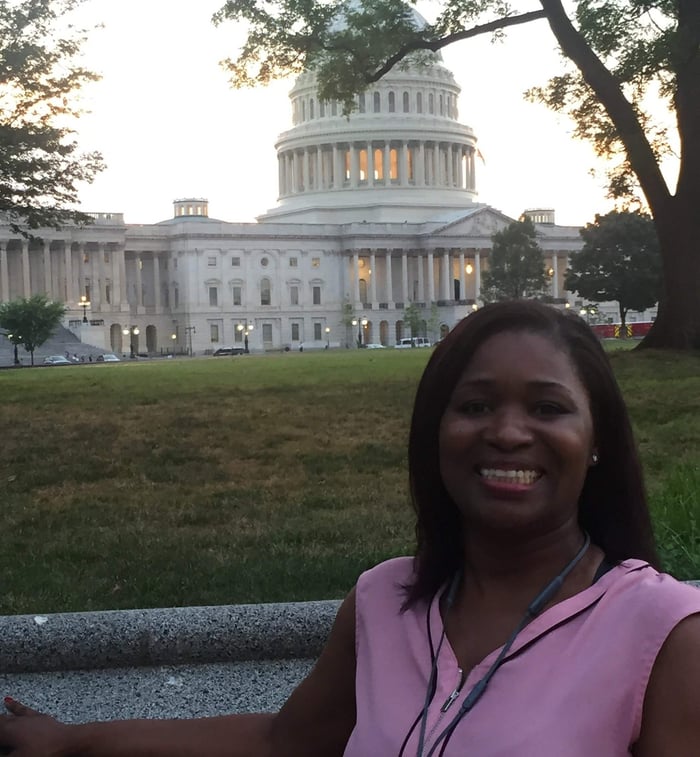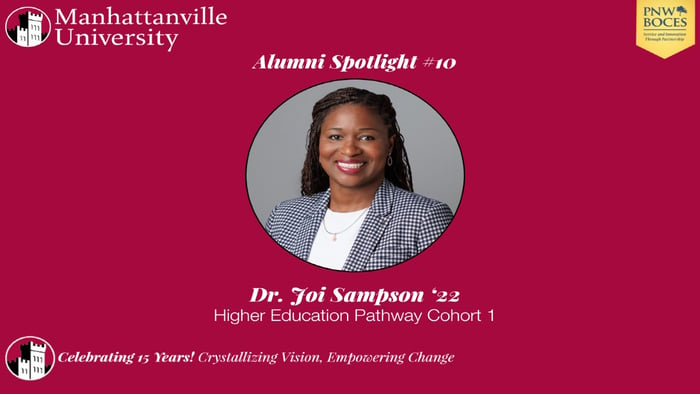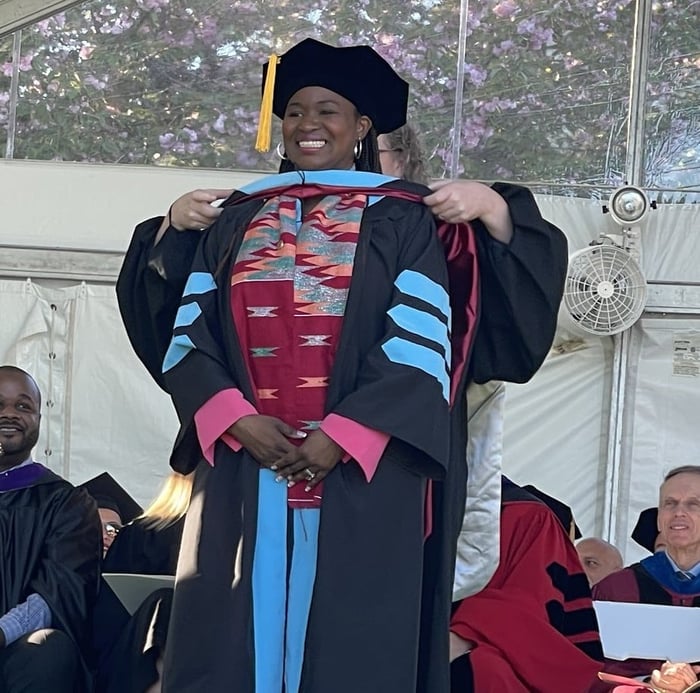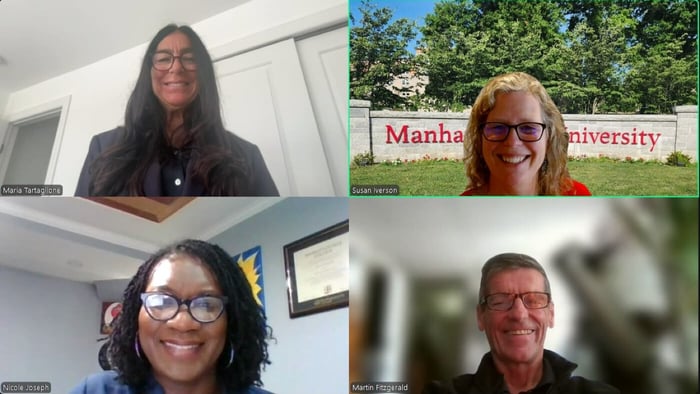Dr. Joi Sampson (EdD ‘22) reflected on her 91÷±≤• journey as both “challenging and invigorating,” a transformative experience that fulfilled her personal dream of earning a doctorate while advancing her professional career. Today, she serves as Assistant Provost for Academic Engagement at Mercy University, where she applies the lessons of her research and her 91÷±≤• experience to foster inclusion, belonging, and student success.
For Dr. Sampson, the 15th Anniversary of the EdD program carries deep personal and professional meaning. On a personal level, it represents the achievement of a lifelong dream she once thought might not be possible. At the time she enrolled, she was working at 91÷±≤• and unsure if pursuing a doctorate would fit into her life. The launch of the Higher Education pathway provided exactly the opportunity she needed, allowing her to advance academically while balancing her work and family responsibilities. Professionally, the program was “life-changing,” opening doors to leadership roles and equipping her to advocate for equity and inclusion in higher education. She views the 15th doctoral program anniversary not just as a celebration of longevity, but as a recognition of the program’s impact in shaping strong, mission-driven leaders across the field of educational leadership.
One of her most vivid memories was participating in a travel study elective to Italy, an experience she describes as eye-opening and enriching. There, she explored international approaches to higher education, including innovative “badge” systems for credentialing, and was inspired by graduate students conducting dissertations in English despite it not being their first language. This opportunity expanded her perspective as a scholar-practitioner and underscored the importance of global collaboration in education.
Also during her doctoral studies, Joi was accepted to participate in the National Association of Student Affairs Professionals (NASPA’s) “Hill Days,” during which she, and other attendees, met with elected officials to discuss higher education policy. She also learned about advocacy, strategic meetings with congressional offices, and a focus on advancing NASPA's policy goals for the student affairs profession. Insights and professional development acquired through this experience has continued to guide her as a scholar-practitioner.

Joi’s dissertation, Our Voices Heard: A Critical Phenomenological Study of Black Professional Women’s Experiences in Predominantly White Institutions, was born from her own journey navigating discrimination and barriers in higher education. As a Black woman aspiring to leadership, she often found herself questioning whether her experiences of being overlooked for promotions, having her expertise doubted, or being subjected to harmful stereotypes were unique or part of a broader pattern. This personal questioning became the catalyst for her study, in which she sought to give voice to other Black professional women who, too often, are rendered invisible in academic spaces. Her research revealed stories of resilience, advocacy, and sacrifice—women who endured systemic bias and limited advancement opportunities yet stayed rooted in their institutions because of their deep commitment to students. Many participants described remaining in difficult positions not for personal gain, but because they felt a responsibility to ensure that underrepresented students had role models, mentors, and advocates. By centering these voices, Dr. Sampson not only documented the persistence of gendered racism in higher education but also highlighted the powerful contributions of Black women whose leadership is frequently unacknowledged.
At Mercy University, Dr. Sampson’s leadership embodies the themes of her research in tangible and meaningful ways. In her role as Assistant Provost for Academic Engagement, she is deeply invested in building systems and practices that affirm belonging for all members of the campus community. Her work emphasizes that equity is not abstract—it shows up in the details, such as who is represented on promotional materials, whether events are accessible to all, and how students and colleagues are invited into decision-making spaces. She mentors both students and staff with intentional care, modeling the belief that authentic leadership comes from listening, validating, and challenging others to grow. Her approach demonstrates that systemic change can begin with small, consistent actions: making a flyer more inclusive, ensuring technology is accessible, or showing compassion in a moment of need. These actions, when multiplied across a campus, create a culture that values and sustains diversity, equity, and inclusion.
Looking ahead, Dr. Sampson envisions her scholarship and leadership as tools to influence higher education beyond her immediate institution. She hopes her research will continue to spark dialogue about the subtle and overt ways in which bias shapes professional experiences and institutional outcomes. Her long-term goal is to see policies and practices that not only recognize inequities but also actively dismantle them. She is particularly passionate about supporting underrepresented students, believing that helping them to persist and graduate does more than award degrees—it changes the trajectory of families and communities. By strengthening pathways to belonging, access, and academic success, Dr. Sampson sees education as a vehicle for justice and opportunity. Her vision is clear: higher education must be a place where every student and professional can bring their full selves and thrive.
Joi describes the EdD program’s legacy in three words: boundless, connection, and forward-thinking. For her, the program provided not only rigorous academic training but also lifelong relationships with colleagues and mentors who continue to shape her professional journey. She recalls that the program’s holistic and forward-looking approach helped her think critically about the evolving challenges facing higher education, particularly issues of equity and access.
For Dr. Sampson, 91÷±≤•’s EdD program represents more than an academic credential—it is a community of leaders who are deeply committed to creating meaningful change in education. As she reflects on the program’s legacy, she emphasizes: “91÷±≤• produces excellent leaders who care deeply about advancing education with purpose, compassion, and courage.”
Donations to the Doctoral Program EmpowerEdD Leadership Fund support our students and their research
The “EmpowerEdD Leadership Fund” Fund was established in 2015 to pay it forward to the 91÷±≤• Doctoral Program. We thank you for your generosity and support of the Doctoral Program in Educational Leadership!
Take Your Career to the Next Level
Elevate your leadership skills, deepen your understanding of critical and contemporary education issues, and learn to help solve the current challenges in P-20 education.
Learn to Inspire Change
The Doctoral Program in Educational Leadership from 91÷±≤•, offered in partnership with Putnam Northern Westchester BOCES,‚ÄØutilizes a forward-thinking approach to educational leadership that is ideal for practicing and aspiring leaders in any educational context. It is designed to support the goals of educational‚ÄØprofessionals who seek to develop their leadership skills for career advancement or current job enhancement.‚ÄØ





